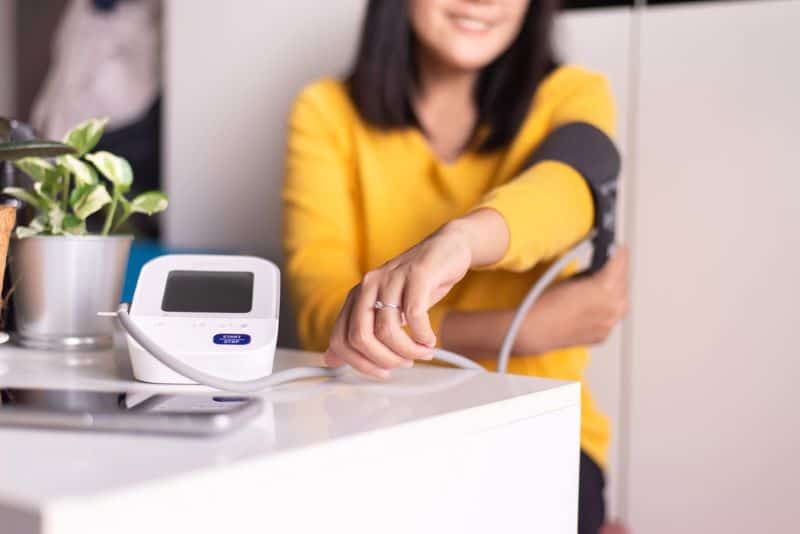Does Medicaid Cover Blood Pressure Monitors?
This information is current as of July 27, 2022.
Did you know that almost half of all American adults have high blood pressure, also known as hypertension? And only one in four of those Americans have it under control.
Pretty scary if you ask me. High blood pressure is straightforward to monitor and can quickly be done with a home monitor. But what about coverage? Does Medicaid cover blood pressure monitors?

Possibly. Medicaid may be funded by both federal and state governments. Still, each state has its own regulations for what is covered by its program. Medicaid may cover blood pressure monitors, depending on what state you live in and what Medicaid program you are part of.
In this article, we will talk about blood pressure and why it’s essential to monitor it. We will also go over how a blood pressure monitor is your best bet and how you can best attain one.
What Exactly Is Blood Pressure?
Blood pressure is exactly that; the pressure your blood pushes against the walls of your arteries, which carry blood from your heart to other parts of the body. Blood pressure is monitored by factoring in two numbers: systolic and diastolic blood pressure.
The first number, systolic blood pressure, tells us how much pressure your blood exerts against your artery walls as your heart beats.
The second number represents diastolic blood pressure. That’s how much pressure your blood’s exerting as your heart rests between beats.
Healthy blood pressure is below 120/80 but not below 90/60.
Why Is Hypertension Dangerous?
Your blood pressure will fluctuate throughout the day. Still, you may have hypertension when it stays consistently above average, especially resting.
If your blood pressure levels stay above average, you are at a higher risk for several health problems.
Heart Disease
High blood pressure makes your arteries less elastic, which decreases the flow of blood and oxygen to your heart, which can lead to heart disease.
Heart Attack
High blood pressure can damage your arteries, which can become blocked, preventing blood flow to your heart muscles, and causing a heart attack.
Stroke
High blood pressure can cause the blood vessels that supply blood and oxygen to the brain to become blocked or burst, causing a stroke.
Heart Failure
High blood pressure forces the heart to work harder to pump blood through the body, causing the left ventricle to thicken. A thickened left ventricle increases the risk of a heart attack and sudden heart failure.
Kidney Disease and Kidney Failure
Over time, high blood pressure causes arteries around the kidney to narrow, weaken and harden. The damaged arteries can’t deliver enough blood to the kidney tissue, causing the arteries to struggle to filter blood properly.
Vision Loss
High Blood Pressure causes a lack of blood flow to the retina, which leads to blurred vision or a complete loss of sight.
Angina
High blood pressure can cause the heart muscles to become so thick that they don’t get enough oxygen, causing angina pain.
Microvascular Disease
High blood pressure causes the walls of the small arteries in the heart to stop working properly, which reduces the flow of oxygen-rich blood to the heart, known as microvascular disease.
Peripheral Artery Disease
High blood pressure causes plague formation on the artery walls. A plague is a waxy substance made up of cholesterol. When too much, your arteries narrow, and blood flow gets restricted.
Preeclampsia or Eclampsia in Pregnant Women
When a pregnant woman’s blood pressure suddenly rises and she has protein in her urine, this is caused by preeclampsia. It is common after 20 weeks of pregnancy. If not treated, the woman can develop seizures resulting in eclampsia, a medical emergency.
How Does a Home Blood Pressure Monitor Help?
Each time you visit the doctor, your blood pressure is taken. But it only reflects how your anxiety is at that exact moment. A home blood pressure monitor can check your blood pressure several times a day.
You can note each reading so that your doctor can better understand what your day-to-day pressures look like.
Does Medicaid Cover Blood Pressure Monitors?
While a blood pressure monitor is considered durable medical equipment, state Medicaid programs will only cover specific devices. In fact, there does not seem to be much consistency in state policies.
Some states will exclude monitors completely. In other states, only certain types of monitors are allowed. In other states, there is no regulation at all regarding blood pressure monitors.
State Medicaid policies change regularly, and the best way to determine if your state will cover a blood pressure machine is by contacting them.
The following is a list of Medicaid websites for each state:
- Alabama: https://medicaid.alabama.gov/
- Alaska: https://health.alaska.gov/dpa/Pages/medicaid/default.aspx
- Arizona: https://www.azahcccs.gov/
- Arkansas: https://humanservices.arkansas.gov/divisions-shared-services/medical-services/
- California: https://www.benefits.gov/benefit/1620
- Colorado: https://www.healthfirstcolorado.com/
- Connecticut: https://portal.ct.gov/HUSKY
- Delaware: https://dhss.delaware.gov/dmma/
- District of Columbia: https://dhcf.dc.gov/service/medicaid
- Florida: https://www.flmedicaidmanagedcare.com/
- Georgia: https://medicaid.georgia.gov/
- Hawaii: https://medquest.hawaii.gov/en/about/what-is-medicaid.html
- Idaho: https://healthandwelfare.idaho.gov/services-programs/medicaid-health
- Illinois: https://abe.illinois.gov/abe/access/
- Indiana: https://www.in.gov/medicaid/
- Iowa: https://dhs.iowa.gov/ime/members
- Kansas: https://www.kancare.ks.gov/
- Kentucky: https://chfs.ky.gov/agencies/dms/Pages/default.aspx
- Louisiana: https://ldh.la.gov/page/4125
- Maine: https://www.maine.gov/dhhs/oms
- Maryland: https://health.maryland.gov/mmcp/pages/home.aspx
- Massachusetts: https://www.mass.gov/topics/masshealth
- Michigan: https://www.michigan.gov/mdhhs/assistance-programs/medicaid
- Minnesota: https://mn.gov/dhs/people-we-serve/adults/health-care/health-care-programs/programs-and-services/medical-assistance.jsp
- Mississippi: https://medicaid.ms.gov/
- Missouri: https://mydss.mo.gov/healthcare
- Montana: https://dphhs.mt.gov/montanahealthcareprograms/memberservices
- Nebraska: https://dhhs.ne.gov/Pages/Medicaid-Eligibility.aspx
- Nevada: https://www.medicaid.nv.gov/
- New Hampshire: https://www.dhhs.nh.gov/programs-services/medicaid
- New Jersey: https://www.state.nj.us/humanservices/dmahs/clients/medicaid/
- New Mexico: https://nmmedicaid.portal.conduent.com/static/index.htm
- New York: https://www.health.ny.gov/health_care/medicaid/
- North Carolina: https://medicaid.ncdhhs.gov/
- North Dakota: https://www.nd.gov/dhs/services/medicalserv/medicaid/
- Ohio: https://medicaid.ohio.gov/
- Oklahoma: https://oklahoma.gov/ohca.html
- Oregon: https://www.oregon.gov/oha/hsd/ohp/pages/apply.aspx
- Pennsylvania: https://www.dhs.pa.gov/Pages/default.aspx
- Rhode Island: https://healthsourceri.com/medicaid/
- South Carolina: https://www.scdhhs.gov/
- South Dakota: https://dss.sd.gov/medicaid/
- Tennessee: https://www.tn.gov/tenncare/members-applicants/eligibility/tenncare-medicaid.html
- Texas: https://www.hhs.texas.gov/services/health/medicaid-chip
- Utah: https://medicaid.utah.gov/
- Vermont: https://dvha.vermont.gov/members
- Virginia: https://www.dmas.virginia.gov/
- Washington: https://www.hca.wa.gov/health-care-services-supports/apple-health-medicaid-coverage
- West Virginia: https://dhhr.wv.gov/bms/pages/default.aspx
- Wisconsin: https://www.dhs.wisconsin.gov/medicaid/index.htm
- Wyoming: https://health.wyo.gov/healthcarefin/medicaid/
Is There Another Way to Get a Free Blood Pressure Monitor?
For the most part, blood pressure monitors aren’t available for free. If you have private insurance, you may be able to obtain a free monitor, but it would depend on your plan.
You may be able to find a free blood pressure monitor through a medical equipment loan program. Many cities offer these programs and refurbished medical equipment for free or at reduced costs.
If your state insurance does not cover a blood pressure monitor, your best bet may be to find a low-cost device. They can be found in many stores and online, and you can often get discounts through certain pharmacies or discount programs.
Below you’ll find a list of blood pressure monitors for under $25.
Walmart
Walmart has several blood pressure machines for under $25.
- The Wrist Blood Pressure Monitor by Windfall is a portable, automatic digital BP machine with a practical pulse meter for $9.98
- The Blood Pressure Monitor by Yirtree has an irregular heartbeat detection cuff with a large display screen. There is a support charging supply for home use and an automatic plastic practical pulse meter for $9.98
- Ametoys, which has an LCD display screen, is a pressure monitor with a wrist pulse meter. It also has an automatic digital pulsometer sphygmomanometer diagnostic tool for $13.01
- The Blood Pressure Monitor Kit by Fanry has an upper arm automatic digital device with an adjustable cuff for $19.99
- The MOBI Health Automatic Upper Blood Pressure Monitor detects irregular heartbeats. It also monitors your pulse rate. It has fast, accurate readings and is doctor recommended. It is $21.99
CVS Pharmacy
CVS Pharmacy also has a few blood pressure monitors for under $25.
- The Mabis Digital Wrist Blood Pressure Monitor sells for $24.99
- The Microlife BP3MY1-1P Wrist Blood Pressure Monitor sells for $24.99
Amazon
Amazon is another great place to find blood pressure monitors for under $25, and I found them to be your best bet.
- The Maguja Blood Pressure Monitor is for home use and sells for $22.99
- LotFancy has a wrist cuff blood pressure machine with the cuff fitting arms between 5.3 and 8.5 inches. It can memorize 120 readings and has an irregular heartbeat detector. It has a large LCD display screen with a protective case. It sells for $18.99
- REIUIR sells a wrist blood pressure monitor with an automatic digital large LCD screen. The monitor gives quick results and stores up to 90 readings. It sells for $16.99
- The Coleby Blood Pressure Monitor Wrist Cuff device has a large cuff with a 7.7-inch circumference. It has an automatic heartbeat detector and sells for $15.99
- The Melin Kay Wrist Blood Pressure Monitor uses an automatic cuff and stores up to 99 readings for two people. It sells for $24.99
Save Money on Your Wireless Phone Service
If you qualify for programs like Medicaid, you may also be eligible for Lifeline or the Affordable Connectivity Program (ACP). Lifeline and ACP are government-run programs that help low-income consumers receive free or heavily discounted communication services.
Click here to find out more and apply for this valuable benefit.
Get a Tablet for $10.01
If you qualify, you can get an 8″ tablet for just $10.01. Apply here to get started!
Save Even More With Recommended Resources and Amazon Deals
Looking to save on additional items? You may want to check out our Recommended Resources page. For example, you can learn how to save 50% on Amazon Prime membership and use your EBT card.



